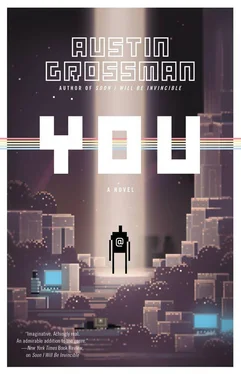I walked Ryan through the level, just as I’d rehearsed it, pausing for slow, cinematic pans over the most impressive areas of the city—the palace, the merchant’s tower. He watched, as passive as if the scene had been on TV. Exactly twice he gave a tiny nod and a “hm” sound—once when I shot a fire arrow into a group of soldiers and once when we cut to the animation of the princess giving her congratulations speech. He didn’t ask any questions.
He thanked us, then he and Don went into Don’s office for an hour-long meeting while the rest of us pretended to work. I later learned the meeting consisted of Ryan making two points: “Add more fire arrows” and “Make the girl fall in love with you.”
Realms of Golf (1992)
“Oh, Jesus,” Don said. “Do you have to play that? We lost so much money.”
“I have to,” I explained. “I’m playing all of them.”
The half elf sliced the fourth hole approach shot badly. “Again!” he shrieked. If only the multiverse hadn’t been depending on him.
The game opened on the immortal foursome dressed incongruously for a pleasant day’s play, Leira in a particularly fetching miniskirt, all at the start of what appeared to be an ordinary eighteen holes. The initial interface wasn’t very different from a normal reflex game.
But starting at the second hole, playing conditions began to degenerate, as the grass thickened and became disturbingly animate. Farther along, a hole was revealed as the eye of a monstrous beast; skeletons emerged from the putting green; fairways twisted and vanished through wormholes or became battlegrounds for contending armies or became boards for absurd alien chess games the characters were forced to play through. In the back nine they began to be dogged by a lone rider who swatted their drives with a broadsword and broke their concentration with arrows. There were bogeys.
No one, it turned out, wanted this game. Golf games were Father’s Day presents, by and large, but it wasn’t clear whose father this one was intended for. But I dutifully played through, facing down the dark rider, who proved to be Death himself, who had gathered the Heroes there so that they could compete for his favor. At the conclusion, the foursome went their separate ways without saying good-bye, as if to say, “Let us never mention this sorry episode again.”
Don lay on his back in the lounge. I sat on a beanbag chair.
“We can’t just say, ‘Draws prettier,’ ” he said. “We need a buzzword, like… GameScaping. TooReal picturation algorithms.”
“You can’t just make up a word,” I said.
“Pentium isn’t a word,” he replied. “That’s why they could copyright it.”
“Cineractive immersion. Next-gen caliber market ration.”
“The new name for adventure is… Trillionth.”
“But… it is going to be better looking, right?” I asked. “Like, better than Quake II ? And that Half-Life thing they’re doing?” I’d seen pictures in CGW.
He sighed. “Lisa’s working on it. I honestly haven’t looked at what she’s doing yet. But even if we are better, it’s not enough if nobody hears about it. I mean, we could be really fucked if this doesn’t work out. People don’t know what kind of margin this company operates on.”
“Why don’t they know? And, um, what kind of margin does it operate on?” I asked.
“It’s my job not to tell them. That’s, like, half of my job.”
“I thought we were next-gen. How are we not next-gen?”
“We are, we are. Sort of. I was just hoping…”
“What?”
“So okay, I have a theory. Simon put us a decade ahead of the competition when he was fifteen years old, right?” he said. “I mean, in a way we’ve been next-gen for the past thirteen years because of the WAFFLE engine. Simon ported that code but we didn’t replace it, ever.”
“Simon was pretty fucking smart,” I said.
“That’s the thing. You remember how Simon was. And you weren’t here, but he just got more that way. He was just too smart and too driven to have stopped there. And he worked all the time, he just didn’t always show it off.”
“Maybe he just burned out,” I said. I wanted to tell him about the phone call. Or the dreams, but that seemed stupid.
“I refuse to believe that Simon did his most interesting work as a junior in high school and then… nothing. I don’t know what it is, but Simon didn’t just sit around. He’d walk around and hack on things, spot-fix issues with the WAFFLE API, tinker with the latest renderer. And then he’d just be in his office coding without an explanation.”
“You checked his machine, right?”
“That’s just it, there was nothing. Once in a while I’d notice WAFFLE’s file size had changed and there were time stamps for recent changes, and maybe it would… feel different, but you could never tell. It’s not like Simon had a change log. And he spent a ton of time on his own stuff.”
“So maybe… WAFFLE is next-gen right now, and we don’t even know about it.”
“Huh. I guess we could just say that in the press release. Who’d even know?”
“Have you looked?” I asked. “Hidden improvements? Undocumented features?”
“God, did we.” Don sat up and shook his head. “Darren hated WAFFLE. He kept hiring guys to try and replace it. Every six months he’d have a new programmer in—some eighteen-year-old, and you know the way he is, he’d say, ‘This is the guy! This is the guy!’ He has that way of making you think you’re the smartest guy in the room. Guys would drop out of college just for the chance.”
“To be the next Simon.”
“Like Toby, he was one of those. None of them got it, not even close, and they’d burn out. Not dumb guys, I’m not saying that. But their version was too slow, too random. It didn’t feel like a world.”
“Yeah.” I could see it. We all cared about games for our own reasons, but Simon was plugged into something extra. Simon had, in his way, taken on reality itself. He hadn’t hedged his bets. I remembered visiting the Pantheon in Rome. The inscription above Raphael’s tomb said, as my classics-literate roommate translated, “Here’s Raphael. While he lived, Nature herself feared he’d outdo her; but when he was dying, Nature thought she’d die, too.”
Before we left for E3, Don confided in me that the only reason Black Arts was still running at all was the money Darren had paid to license the Clandestine intellectual property. That night, I dreamed that Lorac the wizard leaned over my bed to whisper in my ear.
He said, “Everything is changing.”
We set down at Hartsfield-Jackson airport around eleven forty-five at night. Lisa managed to get some sleep on the plane, but I was studying my speaker’s notes for two days from now. At one thirty in the morning we met and walked together down the connecting corridor from the hotel to the convention center. I tried to do a cartwheel and failed. I felt like I was finally living. We were showing at E3 1998. We were really in it. At least there’s this, I thought. I didn’t finish law school, but I’m part of this.
We finished at six in the morning and woke up twenty minutes before the show floor opened at nine. I sat on the edge of the bed, leaning over, hugging myself. My body kept making these small spasms, a mini laugh or sob or heave. After a minute or two I felt ready to stand upright.
No point in changing one Black Arts T-shirt for another, so I put on my show tags and jeans while Matt did the same. The sunlight on the sidewalk was blinding, but the warmth calmed down the fatigue-shuddering.
Читать дальше





![Ally Carter - [Gallagher Girls 01] I'd Tell You I Love You But Then I'd Have to Kill You](/books/262179/ally-carter-gallagher-girls-01-i-d-tell-you-i-lo-thumb.webp)






